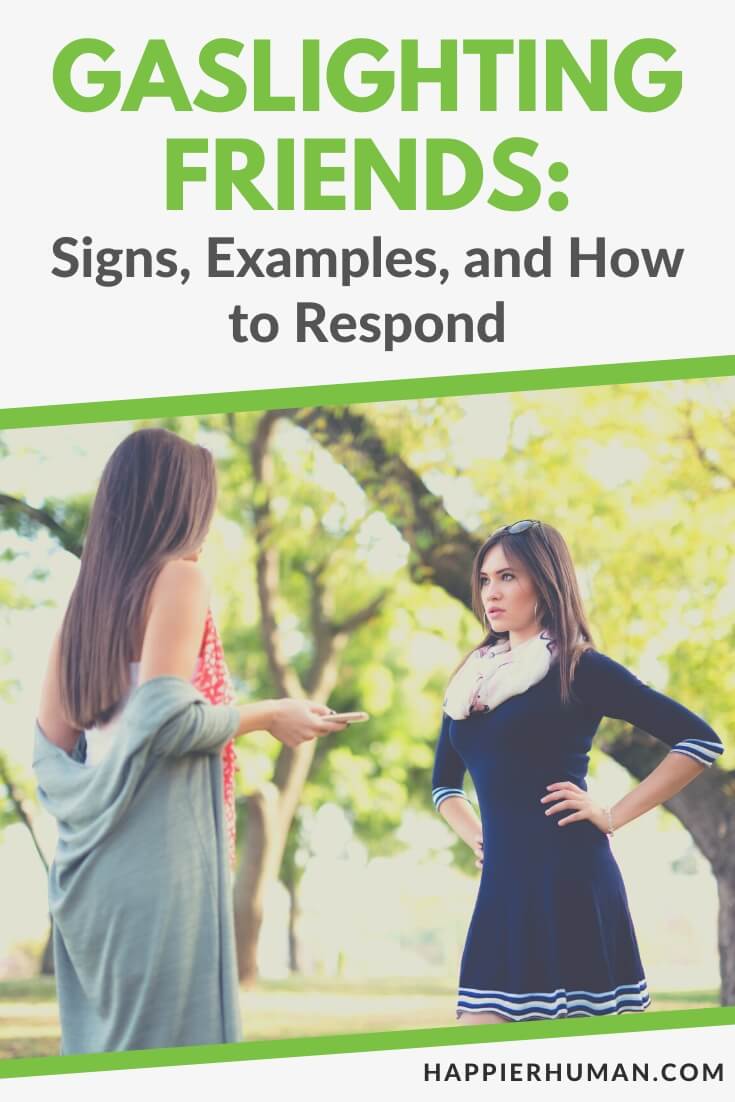The term ‘gaslighting' continues to grow in popularity as people call out toxic behavior. It's important to stand up against someone who treats you unfairly… and friends are no exception.
Friends are supposed to respect and support you. So, if you feel like a friend is mistreating you, we are here to help you identify and react to the toxic behavior of gaslighting.
What is Gaslighting?
Gaslighting is a manipulation tactic that makes someone question their reality. People who gaslight deny someone else’s emotions and perspective. Gaslighting is a form of control to keep someone else in an emotional prison and can seriously affect their mental health.
Constant gaslighting can make you doubt yourself, your memory, and your sanity. The goal of gaslighting is to make you depend on your abuser for the truth. And the “truth” is only what the gaslighter says is true.
A friend is someone you can trust. But they aren't perfect.
Although friends are supposed to be supportive, they may also feel jealous of your accomplishments. Or, they may feel like you are outgrowing them, afraid of losing you, and they begin emotionally abusing you through gaslighting.
Don't allow a friend to manipulate you because gaslighting has horrible effects on your mental health. Gaslighting can affect your self-worth, create doubts about your decision-making, and impact anxiety and depression. That's why it's important to recognize when someone is trying to gaslight you, especially a friend.

Don’t let someone mistreat you just because they are your friend. You must stand up for yourself and express your emotions. Unfortunately, sometimes you may need to end the friendship for your mental health. But a good friend will listen and actively do better.
So today, we’re going to help you identify the signs of gaslighting and how to respond to gaslighting friends.
7 Signs of Gaslighting Friends
Sometimes signs can be subtle or directly attack your emotions or sanity. The worst part about friends who gaslight is that you probably won’t even realize it’s happening because you trust them. However, you will know something is wrong when they deny your emotions or reality.
If you start to feel bad around your friend, it’s time to check if they are gaslighting you. Watch out for common phrases they may say. Here are the signs:
1. Shifting Blame
One red flag to look out for is a friend that never takes accountability. Instead, they shift the blame to you for their mistakes. Even if you have absolutely nothing to do with the situation, they will find a way to blame you. The purpose is to make you feel like everything that happens is your fault.
If everything is your fault, then they are free from accountability. Making you feel like the reason for their troubles can be a massive blow to your self-esteem.
Watch out for friends who use you as an excuse to get out of trouble or blame. It’s one of the easier ways to spot someone who is gaslighting you. Do any of these phrases sound familiar?
“I’m mad because you make me angry.”
“You’re always in the way.”
“Well, I wouldn't have been late if you had told me the right time.”
“I don’t have a problem. It’s you.”
“You’re the one that’s being mean. That’s why I yelled at you.”
2. Overly Critical
A good friend should be willing to tell you the truth even if it’s hard to hear. Usually, that comes from a place of love and support. A friend who gaslights wants to showcase your faults or create faults you don’t even have. If you begin to feel insecure about yourself, it may be because they constantly point out what is wrong with you, even if it’s not true.
Being overly critical makes you believe your friend is the only person you can trust because of their honesty. When in reality, they want you to feel bad about yourself. It’s a way to control and keep you emotionally close by insulting you. Has your friend said anything similar to these examples?
“You talk too much. People find it annoying.”
“Are you going to eat all of that? I thought you were trying to lose weight.”
“You’re laughing so loud right now. Everyone is staring at you.”
“You need to go shopping. People are making fun of your outfits.”
“I don’t think you are smart enough to understand.”
3. Never Apologizes
It takes a big person to apologize. A huge sign that a friend is gaslighting you is when they refuse to apologize. Similar to narcissistic behavior, your friend might never give you the satisfaction of an apology. In their eyes, they don’t want to admit they are in the wrong. Instead, they will deflect and try their best to get out of the situation.
If a friend never apologizes, you cannot begin to forgive their mistakes. Forgiveness plays a crucial role in rebuilding a relationship. If a friend cannot admit they are wrong, they don’t even give you a chance to forgive them. Has your friend ever used these excuses in place of an apology?
“I don’t know why you care so much?”
“It’s not my fault your feelings are hurt.”
“I think you’re just being too emotional.”
“Why am I the one that has to apologize? What about you?”
“I didn’t do anything wrong.”
4. That Never Happened
One of the worst things a friend can do is conveniently “forget” a time when they hurt you. If you bring up a moment when they made you feel bad about yourself, they won’t remember. Instead, they will gaslight you into thinking the moment never happened.
They could insult you one moment and forget what they did the next. The truth is, they remember perfectly. They just don’t want to take accountability for what they did, so they make you believe it never happened. This prevents them from feeling guilty and only leaves you feeling worse.
Don’t fall for their inability to remember something that made you feel bad. You didn’t imagine anything and must remember to believe in yourself. Keep track of when it happens. Has your friend said any of these phrases to you recently?
“I don’t know what you are talking about.”
“That never happened.”
“I think you are imagining things.”
“I literally said the opposite of that.”
“Why are you making things up?”
5. Invalidates Your Feelings
Everyone's feelings are valid. So don’t let a friend tell you what you feel is not worth addressing. Friends should listen to one another without judgment and accepts how you feel. You should also not have your feelings thrown back in your face. Friends should not weaponize your emotions for their gain.
If your friends begin to deny how you feel or make you feel bad about expressing yourself, then they are gaslighting you. As a result, they are invalidating your feelings. If your feelings are not validated, it can negatively impact your confidence and self-esteem.
You may also resent your friend for not being there when you need them. Your feelings are valid, don’t let your friends tell you otherwise. How often do you experience these phrases?
“It’s not my fault you feel that way.”
“It’s not that serious.”
“Honestly, you cry over anything.”
“Why are you so mad? I was joking.”
“You’re upset? What about me?”
6. You’re the Crazy One
One strategy of a gaslighter is to force someone to question their reality. A friend should never make you feel like YOU are the crazy one when they are in the wrong. If your friend makes you believe that situation never happened or happened differently, they are gaslighting you. They will also go so far as to make you think that you are probably going crazy.

You will start to doubt yourself and question your sanity. Remember, you know the truth. Don’t doubt yourself, your emotions, or your reality. You know what you saw and heard. Don’t let someone deny your truth. Watch out for these signs that a friend might be accusing you of something you are not.
“That’s not what happened.”
“I never said that.”
“You’re the one that did that, not me.”
“I wasn’t mad. You were mad.”
“Something is wrong with you.”
7. Openly Lies
Gaslighters defend and believe their lies. Even if you catch them in a lie and show proof, they will protect themselves with even more lies. Friends who continuously lie to you are not to be trusted. It’s vital to cut this behavior as soon as it develops. Friends should be honest and truthful.
Sometimes people make mistakes, and they lie. However, a good friend does not continuously lie to your face.
And, when caught, they should own up to the lie. Have you ever caught a friend in a lie? How did they react? If they double down in their lies and try to make you believe what they say is true, they are gaslighting you. Has your friend ever used these phrases as an excuse for a lie?
“I’m not lying. It’s not my fault you’re remembering it wrong.”
“Oh, so you’re going to believe a stranger over your best friend?”
“Wow, so you just think I’m a liar now.”
“You don’t trust me?”
“I’m your friend. You’re supposed to believe me!”
How to Deal with a Gaslighting Friend
Now that you know the signs of a gaslighting friend, standing up for yourself is just as important to know. How can you call out someone who is gaslighting you if they deny it? Should you just cut ties? No, you are friends with this person for a reason. If you believe the friendship is worth saving, you should work on it.
Also, although we may not know it, everyone has been guilty of gaslighting. We may be in the wrong place in our lives, our emotions might be high, or we are just thinking about ourselves. If your friend is gaslighting you, they might not even know it.
It’s crucial to give your friend the benefit of the doubt and talk with them. Ultimately, you will feel closer to them, and they will treat you better. Follow our seven steps on how to deal with your gaslighting friend.
Step 1: Wait for the Right Moment
After you recognize that a friend is gaslighting you, it’s time to address the abuse. The best time to have a conversation is when you both are mentally stable. As much as you might want to, don’t bring up the situation as the friend is gaslighting you.
You want to be in the right headspace when it happens. It might become an automatic fight if you address your friend at the moment, which you don’t want to have to happen.
You want to have a constructive conversation and create a safe space. So, if it is time to address the gaslighting, pick a time and date. Invite your friend over for a heart-to-heart and prepare for what you want to talk about. Here is a helpful list of how to prepare for your conversation:
Step 2: Find an Impartial Party
Once you have agreed on a time for the conversation, find another impartial friend. You preferably want someone who knows both of you and is willing not to take a side. This is to make you and your friend are comfortable sharing both sides of the story.
It also means neither side can take advantage of the other. An impartial friend can catch on to any current gaslighting, so you are protected during the conversation.
If you cannot find an impartial friend, then maybe consider hiring a therapist. Both of you deserve to have a say in the conversation, a third party can help facilitate and make sure you are both heard.
Step 3: Express Your Emotions
If your gaslighting friend has been doing it for a long time, you may feel closed off. After long-term abuse, you might feel too scared to share your emotions. However, it’s time to stand up for yourself.
One way to do that is to express your feelings. Let them know how it feels when they gaslight you. Make sure you bring up specific situations and how they made you feel.
The most important part of this step is not to let them invalidate your feelings. You know how you feel and deserve to let a friend know how they are making you feel. This step requires you to be open and vulnerable.
The goal is to show your friend the negative impact they have on you. Hopefully, they can see how much they have hurt you and understand where you are coming from.
Step 4: Let Them Speak
Once you have a chance to say your peace, it’s only fair to let your friend speak. Sometimes friends don’t even realize they are gaslighting you. They may feel inadequate and start to express why they did what they did. It’s a way for you to understand where they are coming from.
Having an open and honest dialogue will only make you and your friend closer. Although gaslighting is inexcusable, it’s always good to know why the friend did what they did. If you know why they are gaslighting you, you can begin rebuilding the friendship.
It may be because they feel insecure, or it may have nothing to do with you. Regardless of the reason, it’s important to figure out why they are gaslighting you before you can begin fixing the problem.
Step 5: Offer Solutions
Once you both have a genuine heart-to-heart conversation, it’s time to offer solutions. Your friend might have trouble communicating, feel insecure, or has a problem with lying. No matter the reason for gaslighting, you should devise a solution to stop it.

The first step to finding the right solution to the problem. You and your friend should come up with a strategy on how to communicate better during an interaction. Next time you feel like your friend is gaslighting you try out these helpful communication tactics:
Step 6: Move Forward
You and your friend should feel better at the end of the conversation. The goal of the discussion is to express your feelings and address the gaslighting. Hopefully, in the future, your friend will no longer show signs of gaslighting you. However, if they do, make sure to enact the strategies that you talked about.
If your friend gaslights you again, address it, remind them what you talked about, and let them recognize what they are doing. If the conversation works, they should be able to identify what they are doing and fix their behavior. Make sure to hold your friend accountable so you can continue to be the best of friends.
(OPTIONAL) Step 7: Cut Ties
A good friend deserves a chance to work on themselves for you. They should understand the pain they have caused you and want to fix it. A friend unwilling to change their toxic behavior is not worth keeping around. If you have done everything you can to save the friendship, but they continue to gaslight you, it’s time to end the friendship.
You must put yourself first and never let someone make you feel bad about yourself, especially a friend. If Steps 1 – 6 have not made any difference, then it’s time to change. You deserve a friend who won’t gaslight you but lift and support you. After you cut ties, you can find a friend you can depend on.
Final Thoughts On Gaslighting Friends
Some friendships are worth fighting for, while others are hopeless. It’s up to you to decide who is worthy of your friendship… but remember that friends that gaslight you don’t deserve to be your friend.
Remember our signs and examples of gaslighting friends to protect yourself. Likewise, it’s also important to be a good friend too. Check out our article on How to Be A Good Friend to make sure you’re living up to their expectations.
Finally, if you want to identify YOUR personality type, then take one of these 11 personality tests to better understand what makes you tick.


